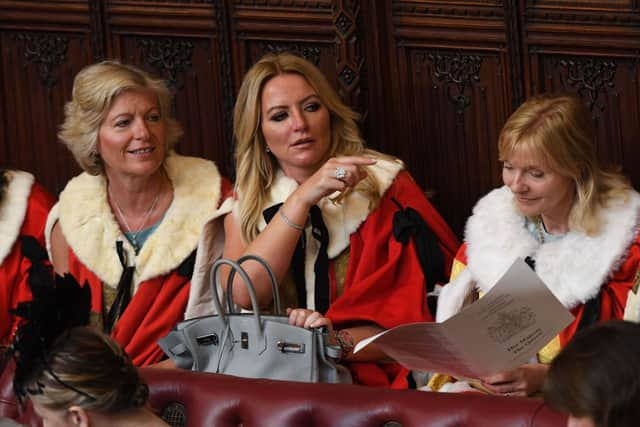Glaswegian Conservative peer Michelle Mone admits involvement in £200m PPE firm
and live on Freeview channel 276
The Glaswegian Conservative peer Michelle Mone has acknowledged for the first time that she was involved with a company that was given government PPE contracts worth £200m during the Covid pandemic.
Mone, who grew up in the East End of Glasgow, is married to Scottish businessman Douglas Barrowman - who also admitted that he was involved in the company facing allegations of cronyism, PPE Medpro. Barrowman is believed to have been an investor in the PPE company and also led the operation to supply personal protective equipment during the pandemic.
Advertisement
Hide AdAdvertisement
Hide AdUntil now the couple had vehemently denied any involvement in the PPE company.
In a response to probing fromThe Guardian newspaper, who broke the story and have been following it for three years now, a representetive for the couple said:“The UK government was fully aware of Baroness Mone’s involvement; like many other peers and MPs on the high priority lane, she acted as an intermediary/liaison between PPE Medpro and the Cabinet Office/Department of Health and Social Care.”
The representative added that Barrowman, owner of ‘Knox Group’, a tax and wealth advisory firm in the Isle of Man, “was the chairman and leader of the PPE Medpro consortium that supplied the UK government”.
The Department of Health and Social Care (DHSC) granted PPE Medpro two contracts in both May and June 2020, near the beginning of the Covid-19 pandemic, to supply millions of face masks and sterile surgical gowns, for a total of £203m.
Advertisement
Hide AdAdvertisement
Hide AdThe Guardian revealed that Michelle Mone had made the first approach to cabinet ministers in 2020 - Michael Gove and Theodore Agnew - telling the pair she could source PPE through her ‘team in Hong Kong’.
Leaked HSBC documents then revealed that Barrowman was paid at least £65m from PPE Medpro’s profits, then £29m was put into a trust for Mone and her three adult children.


The representative claimed that the UK Government were fully aware of their involvement, stating:“Both Doug Barrowman and his wife, Baroness Mone, made a full written disclosure of their involvement to the Cabinet Office prior to the award of the PPE contracts.
“The UK government was fully aware of Mr Barrowman’s role and that his group would make a commercial profit.”
Advertisement
Hide AdAdvertisement
Hide AdWhen investigative journalists at The Guardian asked the representative about the extent of their roles, how much they received from PPE Medpro, and why they denied being involved until this point, the spokesperson declined to provide any further information.
A report published by the Public Accounts Committee in July said there is inconclusive evidence to suggest that Lady Mone acted inappropriately over the awarding of the contracts. At the time of their inquiry, Baroness Mone denied any “role or function” in the company, and her lawyer stated she is “not connected to PPE Medpro in any capacity”.
The committee said: “These are serious defects in (the) government’s stewardship of public money and the committee has previously reported on this issue.
“However, from the evidence in the materials made available to us we cannot comprehensively conclude whether emails from Baroness Mone and the route through the high priority lane led to the PPE Medpro offer being treated differently by government than other offers made in the same way during those abnormal times.
Advertisement
Hide AdAdvertisement
Hide Ad“On the basis of the material we have seen, the risk appetite appears to have been so high at the time that the Department does not seem to have responded to the information it was receiving as part of the contracting process in a way that would be appropriate in normal times.
“The department had an overriding impetus to buy and though it conducted some checks, found aspects of bids or companies that were sub-optimal and put in place some limited safeguards (including assurances and payment on delivery), it then bought the products anyway.
“Colloquially, this might be called panic-buying.”
Comment Guidelines
National World encourages reader discussion on our stories. User feedback, insights and back-and-forth exchanges add a rich layer of context to reporting. Please review our Community Guidelines before commenting.
